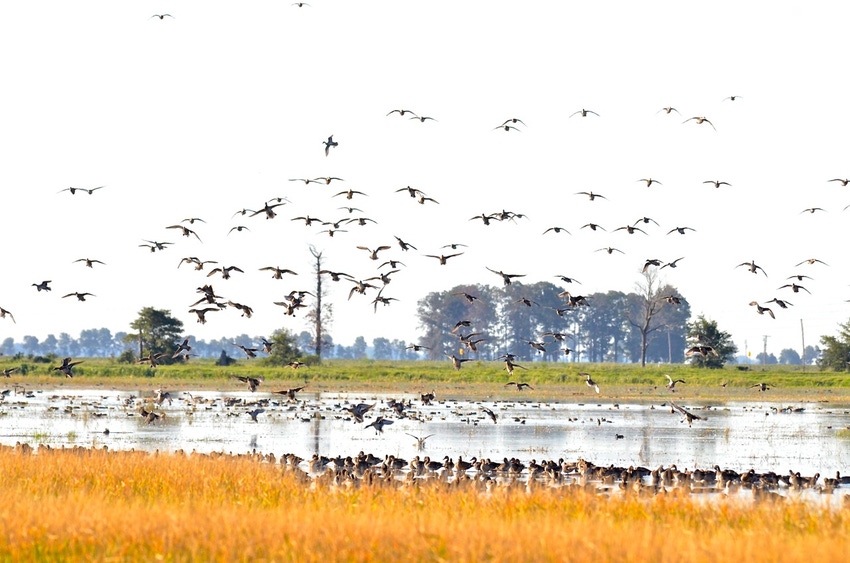July 22, 2015

Farmers, duck hunters, birdwatchers, and conservationists are forming an alliance to strengthen Arkansas’s economy by making more mud. Yes, the mud in reference here is wet dirt. That doesn’t sound like much of a foundation for strength, but in the right place and at the right time it can help generate more economic dollars for Arkansas.
Through the Arkansas Mud Drive, which officially kicks off on July 17th, farmers are being asked to voluntarily flood their fields by closing water-control structures within 14 days after harvest. This practice will keep valuable sediments and nutrients in the fields, as well as provide much needed habitat for waterfowl and shorebirds.
Row-crop agriculture, hunting, wildlife-watching, and fishing combined generate roughly $4.5 billion in economic activity for Arkansas. Row-crop agriculture generated $2.9 billion in 2014 according to the University Of Arkansas Division Of Agriculture. Census Bureau data from 2011, which is the most recent data available, shows that hunting generated $1 billion to the Arkansas economy.
Using the number of duck stamps sold in Arkansas and the average expenditure per day per hunter, the economic contribution of waterfowl hunting alone is around $2.5 million. That is a significant number considering the duck hunting season is only 60 days long.
Wildlife-watching generated $216 million and fishing generated $496 million in Arkansas.
This one simple practice of voluntarily flooding farm fields after harvest provides the opportunity to bolster the economic impact of all of these sectors at the same time.
Since pumping water is not encouraged through the Mud Drive, and only closing structures is required, farmers will not be out any time or money. The goal is to catch rainfall, as it is free; and only a few inches of water are needed to support birds. If structures aren’t closed, the soil that escapes a farm field after harvest has nutrients bound to it that the farmer paid for. That is money being sent down the drain. Additionally, flooding fields after harvest allows weed seeds to decompose or be consumed by birds, reducing herbicide costs in the spring.
There are plenty of duck hunters hoping to find more flooded fields, so this is an opportunity to increase hunting opportunities and farm income through leases. Additionally, bird-watchers seek flooded fields starting in late summer for highly sought after shorebirds. Trip-related expenditures by wildlife-watchers in 2011 were $35 million, so more wildlife-watching opportunities will certainly boost the rural economy for farm-dominated areas of the state. Fishing will improve, as keeping the soil in the fields will enhance water quality and increase sport-fish populations.
The Arkansas Mud Drive is also an opportunity for the youth of Arkansas to learn more about farming and how all of these sectors can work together to make the state stronger and the water cleaner. Students and youth groups have the opportunity to win cash through the Mud Drive by getting pledges from farmers or landowners, as well as by answering a handful of educational questions.
Pledges are due by August 28th, 2015. Farmers are encouraged to fill out the pledge form at their County Conservation District office regardless of whether or not a student approaches them to get the pledge.
The voluntary pledge form for the Mud Drive, as well as the youth competition questions and instructions can be found on the Arkansas Association of Conservation District’s website at www.aracd.org/. Look for the Arkansas Mud Drive on Facebook and follow the great conservation work our farmers, hunters and birdwatchers support.
You May Also Like




